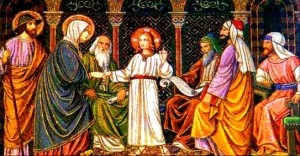This is a new series I’ve long wanted to work on, partly as a vehicle to work out my understanding of the Mass readings as the Church offers us each week and partly as a way to help justify to myself my seemingly ever-growing investment in the Logos software package. Given that I am not ordained, installed, appointed, anointed or anything-else-ed by the Church I can only hope to shed a little bit of light once in a while and, I pray, manage to veer away from heresy that can linger so close to any project such as this. With that out of the way, I suppose I ought to begin.

Probably the first ten times I read the Gospel passage we have this weekend I didn’t really see anything all together too deep in it – it seemed a rather modest anecdote designed to give the tiniest glimpse into the life of the Holy Family and a tiny reminder that Christ, even as a child, was not just any other boy. For me, at least, a deeper meaning to this passage was not readily apparent without some digging and contemplation. As I’ve contemplated the passage further today however, I’m finding layer upon layer of meaning and I can only hope you heard one or more of these in the homily for this Feast.
First I want to address briefly a concern I’ve heard before from non- and nominal Christians – that Mary and Joseph must have been bad parents to lose track of their only son, let alone an only son who came about at the revelation of an angel. We read “when the feast was ended, as they were returning, the boy Jesus stayed behind in Jerusalem. His parents did not know it, but supposing him to be in the company they went a day’s journey, and they sought him among their kinsfolk and acquaintances; and when they did not find him, they returned to Jerusalem, seeking him.” (Lk 2:43-45) In their time the caravans to and from Jerusalem for such great feasts were split into two groups, one for men and one for women, and the children could be in either of those groups; when the caravan would stop the families would meet up again, and it is quite probable that this is when Mary and Joseph, each previously content that the child was safe with the other parent, realized that Jesus had stayed behind. I personally find it interesting that God would draw such a deep story out of what started with at most simple miscommunication.
Next we read that Mary and Joseph found Jesus “after three days” (Lk 2:46) – no coincidence I should think that we see the timeframe of three days when Mary cannot see her son, just as when His body is resting in the tomb between Good Friday and Easter Sunday. Where do they find Him? “[I]n the temple“. Even at this early age we see evidence of His love for the temple which will be shown again in a different way when he overturns tables and chases out money changers and “[h]is disciples remembered that it was written, ‘Zeal for your house will consume me.’ (Ps 69:10)“(Jn 2:17) From the very beginning Jesus had a special love for and devotion to the temple in Jerusalem, setting an example for us to have a particular love for our church buildings. While the Church is not a building, we ought to treat with respect and in a special way those buildings set up and dedicated for the service of God alone.
I’d like to conclude with one final point of reflection although there are so many more possible. Sometimes people have a hard time squaring the idea of Jesus as a perfect child with the fact that He stayed behind in Jerusalem knowing full well his parents were departing for home. Again, however, there is a deeper lesson lurking under the covers if we are willing to look for it. If we glance over to Mt 10:37 we will read, “He who loves father or mother more than me is not worthy of me; and he who loves son or daughter more than me is not worthy of me; and he who does not take his cross and follow me is not worthy of me.” In staying behind in Jerusalem Jesus illustrated this point quite well – He did not love His parents any less before or after this incident but by going to the house of His Father He showed what the ultimate priority is and must be, even more than what His parents may have planned. Indeed, despite a stern questioning, we do not see Mary scold Him but rather “kept all these things in her heart.” (Lk 2:51) In God’s time Jesus was teaching His parents a lesson about ultimate priorities even as at first it appeared He was disrespecting them. Rather than disrespect, however, immediately after this lesson was played out Jesus “went down with them and came to Nazareth, and was obedient to them” (Lk 2:51) just as we ought to show proper deference and respect for our elders and parents in proper keeping with the Fourth Commandment, but never allowing the Fourth Commandment to overtake or supersede the First Commandment. The balancing act can sometimes be delicate, but Jesus in this passage shows that it most certainly can be done.




